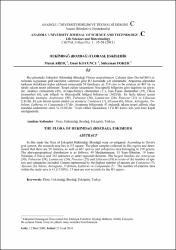Hekimdağ (Bozdağ) Florası, Eskişehir
Abstract
Bu çalışmada Eskişehir Hekimdağ (Bozdağ) Florası araştırılmıştır. Çalışma alanı Davis(1965) tarafından uygulanan grid kareleme sistemine göre B3 karesinde yer almaktadır. Araştırma alanından toplanan örneklerin teşhis edilmesi sonucunda 59 familyaya ait 219 cins ve bu cinslere ait 467 tür ve türaltı takson tespit edilmiştir. Tespit edilen taksonların fitocoğrafik bölgelere göre dağılımı ise şöyle-dir; Akdeniz elementleri (49), Avrupa-Sibirya elementleri (31), İran-Turan elementleri (19), Öksin elementleri (6), çok bölgeli ve fitocoğrafik bölgesi bilinmeyen (362)’dir. En fazla takson içeren familyalar sırasıyla; Asteraceae (50), Fabaceae (38), Lamiaceae (24), Poaceae (21) ve Liliaceae (18)’dir. En çok takson içeren cinsler ise sırasıyla; Centaurea (7), Alyssum (6), Silene, Astragalus, Trifolium, Lathyrus ve Campanula (5)’dir. Araştırma bölgesinde 43 endemik takson tespit edilmiş olup alandaki endemizim oranı % 10.86’dır. Tespit edilen taksonların 13’ü B3 karesi için yeni kare kaydı niteliğindedir. In this study the flora of Eskişehir Hekimdağ (Bozdağ) were investigated. According to Davis's grid system, the research area lies in B3 square. The plant samples collected in this region and determined that there are 59 families, as well as 467 species and subspecies taxa belonging to 219 genera. The phytogeographical distribution is as follows: 49 Mediterranean, 31 Euro-Siberian, 19 Irano-Turanian, 6 Euxin and 362 unknown or other-regional elements. The largest families are Asteraceae (50), Fabaceae (38), Lamiaceae (24), Poaceae (21) and Liliaceae (18) in terms of the number of species and subspecies included. Genera represented by the highest number of species are Centaurea (7), Alyssum (6), Silene, Astragalus, Trifolium, Lathyrus ve Campanula (5) . The number of endemic taxa within the study area is 41 (10.86%). 13 taxa are new records for the B3 square.
Source
Anadolu Üniversitesi Bilim ve Teknoloji Dergisi C - Yaşam Bilimleri ve TeknolojiCollections
- Cilt.01 Sayı.1 [6]


















